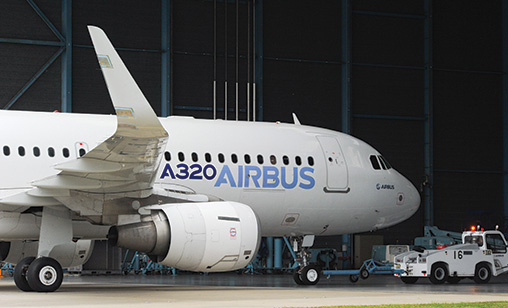Industry Insight Special Report
MTU Aero Engines propels ahead
September 1st 2016
MTU Aero Engines reported its third consecutive quarter of record revenue from its MRO division in late July, with business proving particularly brisk for maintenance of engines for single aisle A320s. Read More »
 |
In the first six months of 2016, MTU’s revenues increased in the commercial and military maintenance sectors. MTU Aero’s MRO business registered the highest growth for the interim period, when revenue increased by 18%, to Euros 893.3 million (US$1.012 billion at press time).
“The principal source of revenue was the V2500 engine for the A320 family, the company said in its profit announcement. “Second quarter revenues in the MRO segment amounted to Euros 464.5 million making this the third successive quarter with record figures,” said chief program officer, Michael Schreyogg.
The engine repair business is under pressure, wrote the Financial Times, as major manufacturers have lowered their prices for airline after-market contracts, which has put pressure on revenue targets for third party supplies such as MTU Aero, the newspaper said.
Briefly…
Rolls-Royce announces accounting change
British Engine group, Rolls-Royce, after it posted its interim results earlier this year said it would no longer take revenues from its MRO contracts before the engines were delivered for repairs. The engine manufacturer and MRO provider will now bill clients as work is done.
Until this change was announced, Rolls-Royce had brought forward profits from its decade long after sales MRO services to compensate for the initial losses the company suffered when it sold engines to airlines. It is estimated that after market MRO contracts make up to 50% of earnings for the major engine manufacturers.
Cathay Pacific Airways signs an A350 contract with Satair
Satair Group has won its first A350 customer with the completion of a deal that requires the wholly owned subsidiary of Airbur S.A.S. to provide Integrated Material Services (IMS) for Cathay Pacific Airways’ ordered fleet of 48 A350XWB aircraft. In May, the airline’s first A350-900 was delivered to the carrier’s headquarters in Hong Kong. Under the terms of the IMS contract, Satair will supply an end-to-end supply chain package for the carrier’s expendable material.
The agreement includes planning, sourcing, purchasing, logistics and inventory management of 15,000 part numbers. Satair started to supply the expendable material for Cathay Pacific’s flight simulators, upfront stocking of outstations and the airline’s central stock in Hong Kong from May.
Lufthansa Technik expands China Airlines partnership
China Airlines (CAL) and global MRO, Lufthansa Technik AG, have expanded their partnership to include total component support for Taiwanese carrier’s A350 fleet. The Total Component Support TCS package requires the Hamburg-headquartered MRO to provide CAL with maintenance, reliability monitoring and enhancement and logistics support for the airline’s A350 aircraft when needed in Europe and The Americas as well as the Asia-Pacific.
Lufthansa Technik has been supplying material for CAL’s A330 and A340 fleet under a TCS contract since 2010.
THAI seeks partner for MRO “smart” hangar
The Asia-Pacific’s major maintenance, repair and overhaul (MRO) businesses are centred in Singapore, Hong Kong and China. But Thai Airways International is hoping to leap frog its rivals by building a new facility that “would be the best in the region”.
The “smart” hangar will be built at U-Tapao airport south of Bangkok and will serve as a computerized“hospital” for aircraft, according to THAI executive vice-president, Chalermpon Intarawong.
THAI has MRO facilities at the airport, but is in talks with Air France with the goal of setting up a joint venture between THAI and the European airline. “We need a huge amount of money to build a smart hangar, but in terms of value, it can be used for up to 30 years,” said Chalermpon.
The “smart” hangar will run all airline checks and repairs on computer systems. Aircraft will be scanned to identify engine, fuselage, cockpit and cabin defects. Inspections will be supported by high-definition cameras and robots which can even be controlled to check inside the fuel tanks.
THAI hopes to draw business away from the established MRO operations elsewhere in the Asia-Pacific, but specifically from Singapore, Hong Kong, China’s fast growing airlines like Malaysia’s AirAsia Group.
The flag carrier has decommissioned almost half of its fleet of about 100 aircraft in the last three years as it attempts to turn around its struggling business. The company needs to keep its repair unit active. It has increased its third party MRO customers by 10% in 2016, to 40% of its total maintenance business, said Chalermpon.